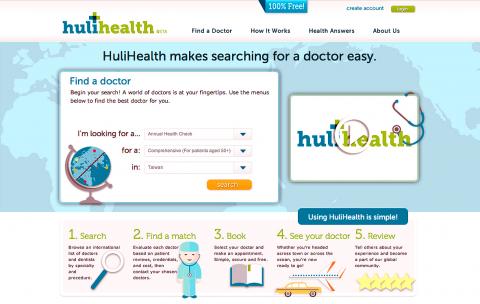New Web startup Hulihealth (www.hulihealth.com) aims to create a comprehensive database of the best doctors in the world.
Now in its beta stage, the Web site lists doctors in Taiwan vetted by Hulihealth for the quality of their care and ability to treat foreign patients. Hulihealth’s section for this country, which went live less than three weeks ago, currently features two Taipei City clinics that offer annual health checkups, Eonway Health Maintenance Center (永越健康管理中心) and Lianan Wellness Center (聯安診所). It will add dentists, optometrists and cosmetic surgeons soon.
“We consider ourselves more than just a medical tourism company,” says founder Alejandro Vega. “We are about connecting patients and doctors no matter where they are.”

Photo: Bloomberg
Hulihealth’s pilot program also includes Panama and Costa Rica. Vega says the company’s goal is to eventually list the top 10 percent of doctors and dentists in every country on its site.
Its target base is not just medical tourists, but also expats and locals. The site will be available in Chinese at the end of this month.
In Taiwan, Hulihealth taps into a rapidly growing industry. Richard Wu (吳明彥), the chief executive officer of the Taiwan Task Force for Medical Travel (台灣醫療服務國際化專案), estimates that annual revenue from medical travelers treated at the 32 hospitals tracked by the task force has increased by 30 percent each year since 2008, earning a total of US$100 million in 2010.

Photo Courtesy of Hulihealth
But Taiwan’s medical industry still needs to cultivate its international reputation, says Wu. The task force is partnering with Hulihealth as part of its promotional efforts.
“It takes time to build up trust with patients and doctors,” says Wu. “Compared to Singapore and Thailand, which have already built up their country’s brands, Taiwan still faces that challenge.”
Hulihealth markets itself to hospitals and clinics as a way to reach a new clientele.
“It gives us a platform to promote our services,” says Sherry Shih (施白), the deputy executive director of Eonway. “Before, patients usually found us through word of mouth or online searches.”
For users, Hulihealth provides a comprehensive overview of a doctor’s credentials and a free and easy way to book appointments online. It makes money by taking a commission from doctors, who are not allowed to charge Hulihealth users more than other patients, for each appointment booked.
One of the Web site’s first patients in Taiwan, Kathie (who requested that her last name not be published for privacy reasons), says Hulihealth caught her eye because it reminded her of using Opentable.com to book restaurant reservations while living in New York City.
Kathie, a consultant who moved to Taiwan 18 months ago, had gone for a checkup at Taiwan Adventist Hospital (台安醫院) based on recommendations she saw on an Internet forum, but found the experience frustrating.
“Given how it was ranked in terms of being an expat-friendly hospital, I actually didn’t find it very expat friendly,” says Kathie. “It was taking a number and waiting in line for a really long time, and when I finally saw a doctor it was for under five minutes.”
In contrast, booking an annual health checkup on Hulihealth was “painless and simple.” Kathie also found the ability to leave feedback reassuring.
“In general, there is a good overall description [of clinics] and I see it as a curated selection,” says Kathie. “I’m like, OK, they are not going to put something on there that I am going to hate.”
Vega came up with the idea for Hulihealth after meeting medical tourists on a flight from Costa Rica to the US.
“More than the travel itself, I was intrigued by the problem of finding the doctors providing the best fit for them locally or abroad,” says Vega. “Some countries don’t have the right technology or expertise. Some have it or they are very expensive and have very long waiting lines.”
Hulihealth’s eight-member team plans to gradually add doctors, handpicking them based on advice from medical leaders and organizations in each country. In Taiwan, Hulihealth chief operating officer David Chao (趙令偉) has been working with the Taiwan Task Force for Medical Travel, which is organized by the Department of Health, to find doctors and create an advisory board that will guide Hulihealth as it expands its services in this country.
Chao has visited 10 hospitals across Taiwan, in addition to specialty clinics. The purpose of the visits is two-fold: to pitch Hulihealth to doctors and assess their ability to treat foreigners.
“Basically for me, the question is, at the end of the day, would I go there myself?” says Chao, who was raised in England. “Would I recommend that somebody in my family go there?”
Hulihealth’s competitors include medical travel Web sites like PlacidWay and Patients Without Borders. Many operate like travel agencies by offering packages that include doctor appointments, flights and hotel rooms.
Vega says that Hulihealth will differentiate itself by offering greater transparency and allowing patients to pick and evaluate their doctors.
After patients complete an appointment, they are invited to leave feedback under their real name or a pseudonym (the Web site will operate in compliance with privacy laws as set forth under the US’ Health Insurance Portability and Accountability Act (HIPAA)).
Aside from providing customer service to handle patient concerns or questions, Hulihealth takes a hands-off approach; Vega says the Web site will not offer doctor or hospital recommendations.
“It is first Hulihealth’s vetting process and then trying to build a community within the Web site where patients themselves can provide feedback about doctors,” says Vega.

William Liu (劉家君) moved to Kaohsiung from Nantou to live with his boyfriend Reg Hong (洪嘉佑). “In Nantou, people do not support gay rights at all and never even talk about it. Living here made me optimistic and made me realize how much I can express myself,” Liu tells the Taipei Times. Hong and his friend Cony Hsieh (謝昀希) are both active in several LGBT groups and organizations in Kaohsiung. They were among the people behind the city’s 16th Pride event in November last year, which gathered over 35,000 people. Along with others, they clearly see Kaohsiung as the nexus of LGBT rights.

Jan. 26 to Feb. 1 Nearly 90 years after it was last recorded, the Basay language was taught in a classroom for the first time in September last year. Over the following three months, students learned its sounds along with the customs and folktales of the Ketagalan people, who once spoke it across northern Taiwan. Although each Ketagalan settlement had its own language, Basay functioned as a common trade language. By the late 19th century, it had largely fallen out of daily use as speakers shifted to Hoklo (commonly known as Taiwanese), surviving only in fragments remembered by the elderly. In

Dissident artist Ai Weiwei’s (艾未未) famous return to the People’s Republic of China (PRC) has been overshadowed by the astonishing news of the latest arrests of senior military figures for “corruption,” but it is an interesting piece of news in its own right, though more for what Ai does not understand than for what he does. Ai simply lacks the reflective understanding that the loneliness and isolation he imagines are “European” are simply the joys of life as an expat. That goes both ways: “I love Taiwan!” say many still wet-behind-the-ears expats here, not realizing what they love is being an

In the American west, “it is said, water flows upwards towards money,” wrote Marc Reisner in one of the most compelling books on public policy ever written, Cadillac Desert. As Americans failed to overcome the West’s water scarcity with hard work and private capital, the Federal government came to the rescue. As Reisner describes: “the American West quietly became the first and most durable example of the modern welfare state.” In Taiwan, the money toward which water flows upwards is the high tech industry, particularly the chip powerhouse Taiwan Semiconductor Manufacturing Co (TSMC, 台積電). Typically articles on TSMC’s water demand